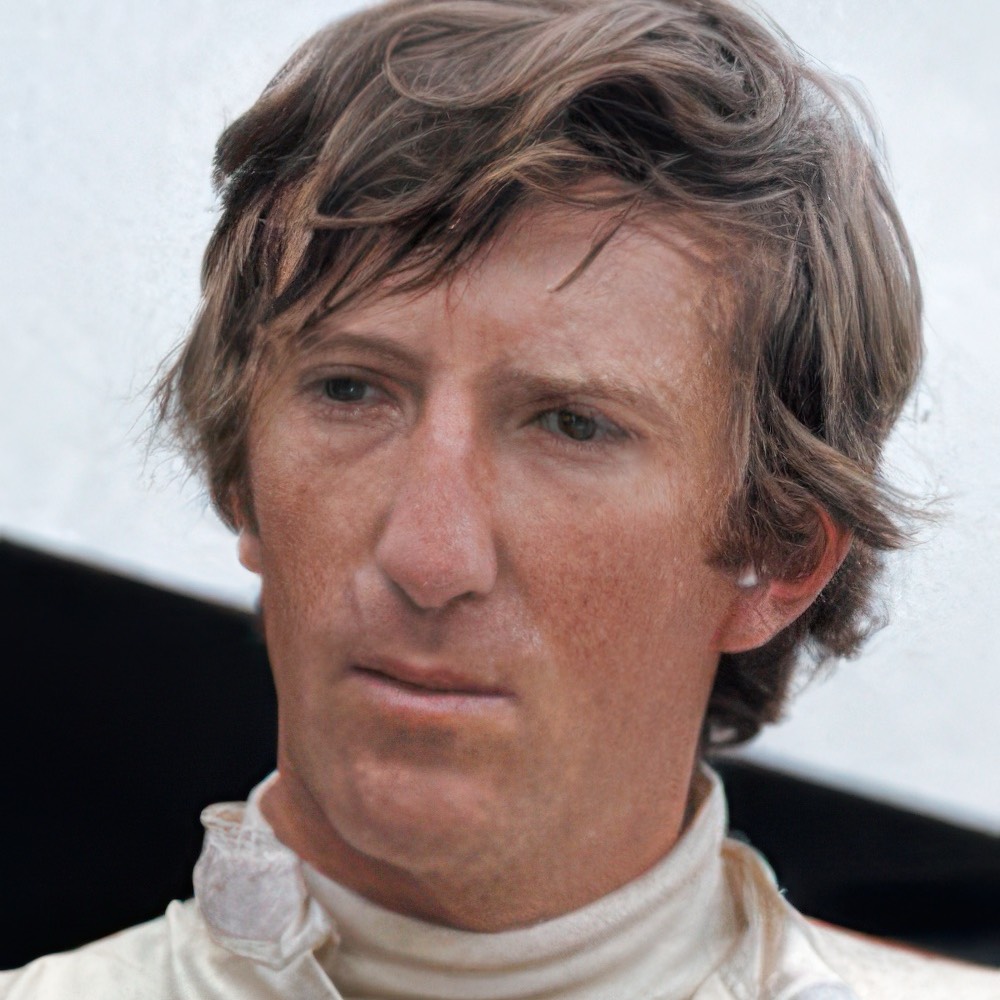
Jochen Rindt
World Championships
1970
Career Statistics
Biography
Karl Jochen Rindt (18 April 1942 - 5 September 1970) was an Austrian racing driver who competed in Formula One from 1964 to 1970, forever immortalized as the sport's only posthumous World Champion—a tragic distinction earned when he was killed during qualifying for the Italian Grand Prix while leading the championship standings with an insurmountable points advantage. Born in Mainz, Germany, Rindt was orphaned as an infant when his wealthy parents, Moritz and Emma Rindt, were killed during an Allied bombing raid in 1943. His maternal grandparents adopted him and raised him in Graz, Austria, where he developed into a strong-willed, confident young man with exceptional natural athleticism. After briefly considering a career as a professional swimmer or alpine skier, Rindt discovered motor racing and immediately found his true calling.
He began competing in 1961 and quickly established himself as an extraordinary talent, dominating Formula Junior and Formula Two with aggressive, spectacular driving that combined raw speed with remarkable car control. His success earned him a Formula One debut at the 1964 Austrian Grand Prix with Rob Walker Racing, beginning a seven-season F1 career that would see him become one of the era's fastest and most exciting drivers. Early seasons with Cooper (1965-1967) and then Brabham (1968-1969) brought regular points finishes and podiums but no victories, as Rindt's bad luck with mechanical reliability became notorious—he retired from 33 of his first 60 Grands Prix. Despite the frustrations, Rindt's speed was undeniable, and his aggressive, sideways driving style made him a fan favorite and earned deep respect from rivals including his close friend Jackie Stewart.
For 1970, Rindt made the pivotal decision to join Lotus and partner with legendary designer Colin Chapman, despite serious misgivings about the team's fragile, lightweight cars and Chapman's reputation for prioritizing speed over safety. Rindt's concerns proved prescient when teammate Graham Hill suffered career-ending leg injuries in a testing accident, but Chapman's revolutionary Lotus 72 proved devastatingly fast when it worked properly. After struggling with the car's development in the early season, Rindt found his rhythm spectacularly, winning the Dutch Grand Prix at Zandvoort in June. What followed was one of Formula One's greatest winning streaks—four consecutive dominant victories at the Dutch, French, British, and German Grands Prix, establishing an apparently unassailable 20-point championship lead with four races remaining.
The circus moved to Monza for the Italian Grand Prix, where teams removed aerodynamic wings to reduce drag and maximize straight-line speed on the high-speed circuit. On Saturday, 5 September 1970, during final qualifying, Rindt's Lotus 72 inexplicably turned sharp left under braking for the Parabolica corner. Whether caused by aerodynamic instability from running without wings, failure of an inboard brake shaft, or driver error has never been definitively determined. The Lotus struck the poorly-protected Armco barrier at approximately 140 mph, and the impact completely tore off the car's chisel nose when it slewed under the metal crash barrier.
Tragically, Rindt refused to wear the crotch straps of his safety harness because they were uncomfortable, and during the impact, he "submarined" forward in the cockpit. The lap belt buckle caused fatal injuries to his aorta and throat, killing him almost instantly at age 28. Despite the tragedy, the championship battle continued. Jacky Ickx won the next race in Canada, closing to within 17 points of Rindt's total, but could only manage fourth place at the United States Grand Prix, making it mathematically impossible to overhaul the deceased Austrian.
On 17 November 1970, at FIA headquarters in Paris, World Championship trophy was presented to Rindt's widow Nina by Jackie Stewart in a somber ceremony. Jochen Rindt remains Formula One's only posthumous World Champion—a record no one ever wants to see equaled. His six victories in 1970 from just nine starts represented a winning percentage of 67%, one of the highest in F1 history. Beyond the statistics, Rindt is remembered for his spectacular driving style, fierce competitiveness, deep friendships within the paddock, and as yet another casualty of an era when motor racing's dangers were accepted as an inevitable part of the sport.
His death, following the losses of Jim Clark (1968), Jochen Rindt (1970), and preceding those of many others, eventually catalyzed the safety reforms that would transform Formula One from a deadly lottery into the comparatively safer sport it is today.